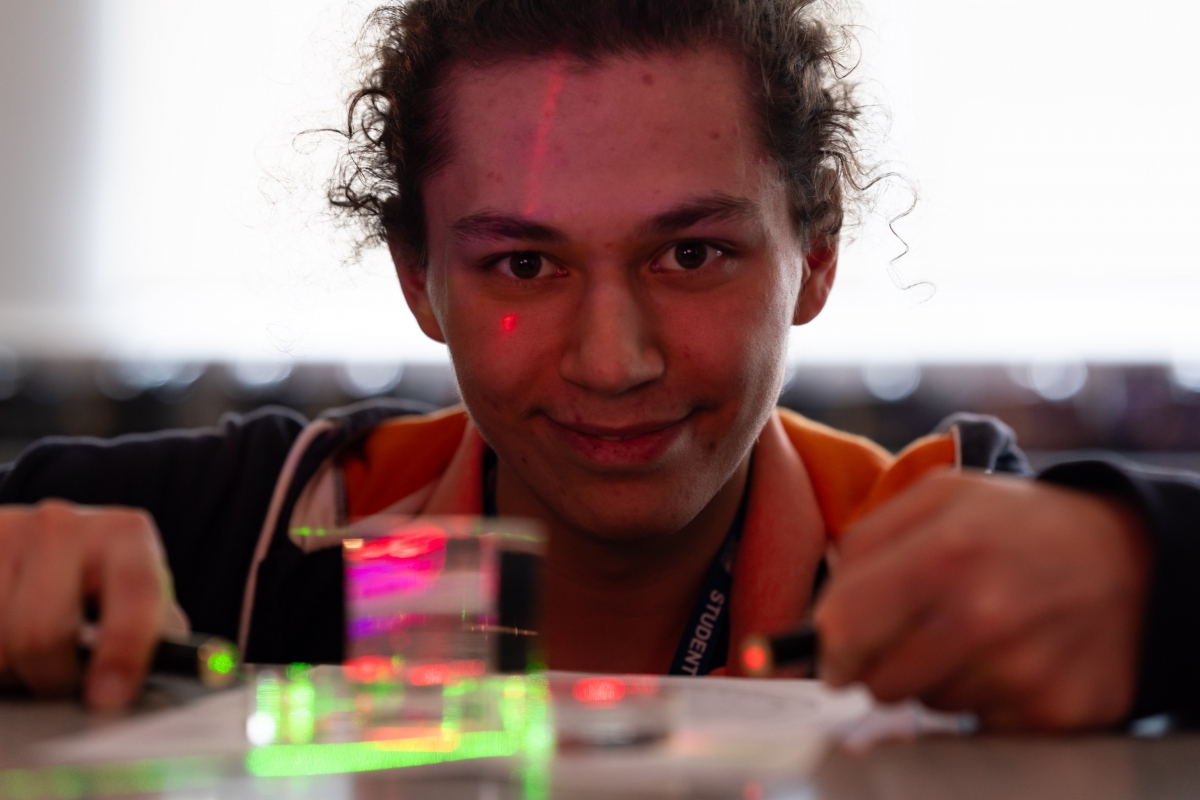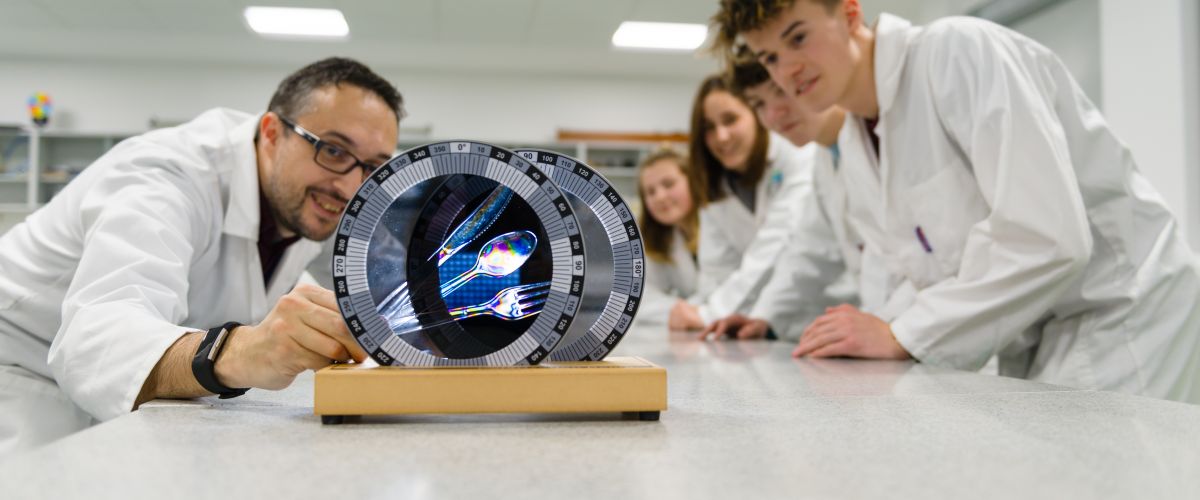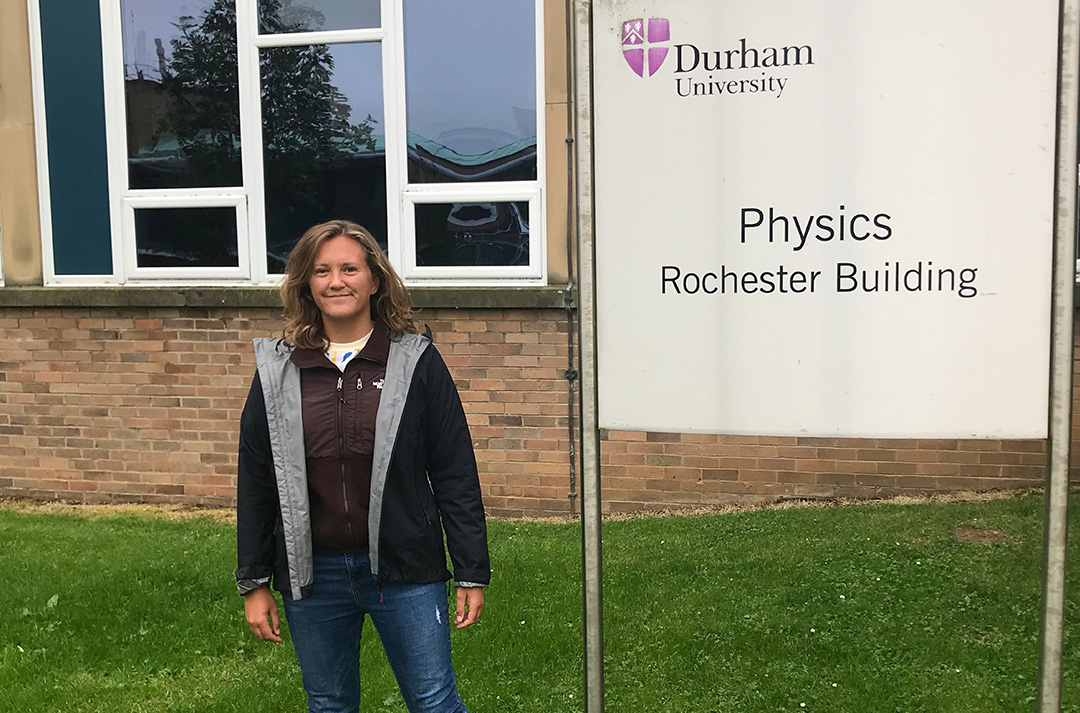A Level Physics
If you are interested in questions like "what is a Higgs boson?" and "what happens if I travel near to the speed of light?", then the A Level Physics specification will challenge you to consider these questions and many more.
Key information
Science / Full Time / A Levels and Equivalent

Why choose this course?
Physics allows you to understand the fundamental structure of the universe from atoms (or smaller!) to galaxies (or bigger!) and how the matter within the universe interacts. You will discover that the same underlying physical laws can be applied from everyday situations such as electric circuits or theme park rides, to complex situations like particle accelerators or black holes!
In your first year of study you’ll begin by exploring classical (Newtonian) mechanics, allowing you to understand how objects move and interact in terms of everyday forces. You’ll then progress into explaining electric circuits in terms of current, potential difference and resistance, by considering the motion of charge carriers. You will also learn about material properties and how different materials behave when exposed to different forces before moving on to consider classical wave theory, followed by more contemporary physics, such as using observational evidence to argue for a quantum mechanical treatment of light.
In your second year of study you will build upon the concepts already met by initially considering more complex mechanics such as circular motion and momentum transfer, followed by a thorough analysis of electric and magnetic fields (and their applications). This content is then brought together to consider how particle accelerators and detectors function, and the particles we have discovered as a result. You then move on to studying a more mathematical representation of oscillations, followed by the physics of nuclear decay and thermodynamic systems, which are then brought together (with an understanding of gravitational fields) to consider how stars are formed. From this you will then consider star life-cycles (including neutron stars and black holes), astronomical measurements and galaxy motion, culminating in addressing current astrophysical concepts such as the Big Bang, dark matter, dark energy and the ultimate fate of the universe.
What will I learn?
Topics are studied over two years and are assessed at the end of the course through three exam papers:
Paper 1 (30%) - Topics
Mechanics (Motion and Forces)
Electric Circuits
Further Mechanics
(Momentum and Circular Motion)
Electric and Magnetic Fields
Nuclear and Particle
Paper 2 (30%) - Topics
Materials (including fluid dynamics
Waves and Particle Nature of Light
Thermodynamics
Nuclear Radiation
Oscillations
Space and Gravitational Fields
Paper 3 (40%) - General and Practical Principles in Physics
Synoptic problems based on contexts that require solutions drawing on two or more different topics met over the whole course.
Assessment of conceptual and theoretical understanding of experimental methods (including practical skills). Science Practical Endorsement (continuous assessment).
You will build practical skills throughout the A Level course which will lead to a practical endorsement. You will be required to undertake 16 core practical investigations. The practical skills developed throughout the A Level course will be assessed based on direct observation of your competency in a range of skills that are not assessable in written exams. Evidence to support the practical endorsement is gained over the course of the two years and is assessed on a pass or fail basis.
Assessment Arrangements
Your achievement in this subject is dependent upon excellent attendance, punctuality and effort. You will learn in a friendly atmosphere, using a variety of assessment methods. You will be assessed through end of topic tests under timed conditions, regular homework and through completion of class activities. You will be given regular feedback on your progress. Investigative skills and understanding are a vital part of the scientific process and you will be expected develop your practical proficiency throughout the course. You will undertake an end of year assessment at the end of year 1 and mock examinations on each paper in advance of your final exams in Year 2.
Information & Support
We encourage all students to read widely and conduct their own research into the topics they are studying. You will be expected to undertake at least 4-6 hours of independent study time per week. There is a wide range of support material available in the Learning Resource Centres and on the course VLE. Throughout the year, you will be able to access additional support and opportunities to stretch and challenge you.
Where will it take me?
A Level Physics is designed to lead to Higher Education. Physics is a highly respected A Level that is valued for most degree subjects. It is also valued by employers worldwide. If you want to study physics, electronics or engineering you will need A Level Physics. However, an understanding of physics is desirable for a variety of university courses including mathematics, computer science, chemistry, geology, medicine, dentistry, veterinary science, environmental science. Studying the physical sciences at university level provides you with many skills such as problem solving, communication, creativity and teamwork. Physical scientists are much sought after and can pursue careers in many exciting and varied fields of work including meteorology, finance, law and journalism.
What will I need?
Five GCSEs at grade 4 and above including at least grade 6 in Physics or 66 Combined Science and at least grade 6 (7+ recommended if A Level Maths is not being undertaken alongside) in Maths and at least grade 5 in English Language or Literature.
Note: All students are recommended to study A Level Mathematics alongside A Level Physics. Students who want to study a degree in Physics or Engineering at university are expected to study A Level Mathematics as well.
Additional Information
Awarding Body:
Edexcel (Pearson)
To obtain more information about this course, please call: 01208 224000 or email enquiry@callywith.ac.uk





.jpg)